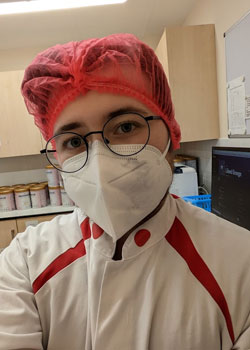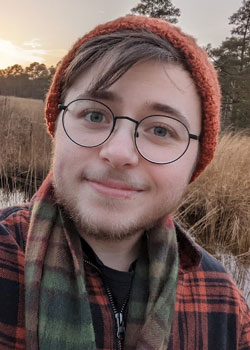International Transgender Day of Visibility: James Oliver
Posted on March 30, 2022 by Microbiology Society
International Transgender Day of Visibility (TDoV) was founded by trans activist, Rachel Crandall; it takes place on 31 March every year to celebrate trans and non-binary people as well as raise awareness of the discrimination faced by trans people.
Back in July 2019, we interviewed member and Champion, James Oliver, for LGBTSTEM Day (now LGBTQ+ STEM Day) and we thought TDoV would be a good opportunity to catch up with him to find out how life has changed over the last few years and allow him to share his experiences.
“I encourage embracing your identity as much as possible, but sometimes you need to prioritise your safety before you focus on anything else.” James Oliver

Back in 2019, we interviewed you for LGBTSTEM Day, could you update us on your studies/work?
I finished up my undergraduate dissertation only a few days after the first UK lockdown started and, thankfully, graduated with a first! I’ve decided not to pursue higher education for now (primarily because I don’t want to relocate away from the lovely countryside just yet!).
Over the past three years, I will admit that I have drifted away from professional microbiology as there aren’t many relevant job opportunities where I live. I have worked in a launderette, an aquarium, a COVID-19 testing laboratory, an infant formula factory, and I have just started a new role in a candle factory – handling regulatory affairs and poison controls. I miss the joy of seeing bacterial colonies growing on an agar plate, but I am glad to be working somewhere that smells a bit nicer than the inside of an incubator!
It’s TDoV on 31 March 2022; will you be doing anything to celebrate or raise awareness?
TDoV is quite close to my ‘trans birthday’ (9 March, e.g. the day I realised I was trans) so I tend to bundle the two celebrations together. I take the time to post about my identity on social media, which is something I’ve found myself doing much less often than I used to, partially because I now pass (as a man) in my day-to-day life, and as such, I don’t feel the same drive to ‘come out’ unless it comes up in conversation. So, on TDoV, I do like to reconnect with the public side of my identity.
In our previous interview, we asked a lot about your experiences as a member of the LGBTQ+ community, but are there any particular challenges you’ve faced that are more specific to being a trans man at university/in STEM?
I can answer this with a very grateful “no”. As in my 2019 interview, I am very lucky to have encountered no obstacles with university or work because of my gender identity; any minor concerns have now been essentially erased as I now pass full-time as a man. I understand that I am the exception, not the rule, and that I am in a privileged position. For this, and for the understanding of those I meet, I am eternally grateful.
Is there any advice that you would give to other people whom identity as trans working in or studying microbiology (or hoping to in the future)?
My biggest piece of advice would be to gauge the environment you’re in before coming out. Science is, unfortunately, still overshadowed by the ‘old ways’, which means you may be likely to encounter a senior member of staff who doesn’t exactly approve of your existence. I encourage embracing your identity as much as possible, but sometimes you need to prioritise your safety before you focus on anything else.
Do you have any role models, if so, who?
Dr Michael Macey from the Open University. He was my internship supervisor and is now my beloved co-author. I haven’t seen him in person for three years, but he continues to be a source of friendship, advice and overwhelming kindness. He’s a brilliant scientist, a tremendously funny person and he balances his massive academic workload with a positive attitude like no other!

Since the last interview, there has been a pandemic. How has COVID-19 impacted your studies and career?
I moved back home when lockdown started, as I wanted to be close to my family in case the worst happened. I had intended to move to a city to pursue further education, so the pandemic turned my plans upside down. Having COVID-19 looming over me for so long, I realised that my focus should be on my partner, my family, my hobbies, and my life outside of wage-earning; these are the things that define and will survive me, not my career.
Have there been any specific challenges related to being trans during the pandemic that you’d like to highlight?
Trans healthcare has become a huge, huge problem. I am luckily already at the end of my medical transition, aside from the hormones I will take for the rest of my life, but transitioning during the pandemic has become a new struggle for those who are coming out now. As people have spent time alone at home during the pandemic, more and more people have naturally discovered new things about their gender identities – this has put a massive weight on the already under-funded and over-burdened gender clinics in the UK. I believe that some waiting lists for a first appointment are reaching five or six years. It’s a cruel situation for anyone to be in!
Finally, could you tell us why you decided to become a Society Champion?
I wanted to help other young scientists get involved with academia and industry. I know first-hand how difficult it can be to even find work experience in science, so I hoped to advise and encourage others like me!
If you would like to get more involved with Society activities, by taking part in an awareness day interview, or becoming a Society Champion, you can find out more via our Get Involved webpage or email [email protected].

